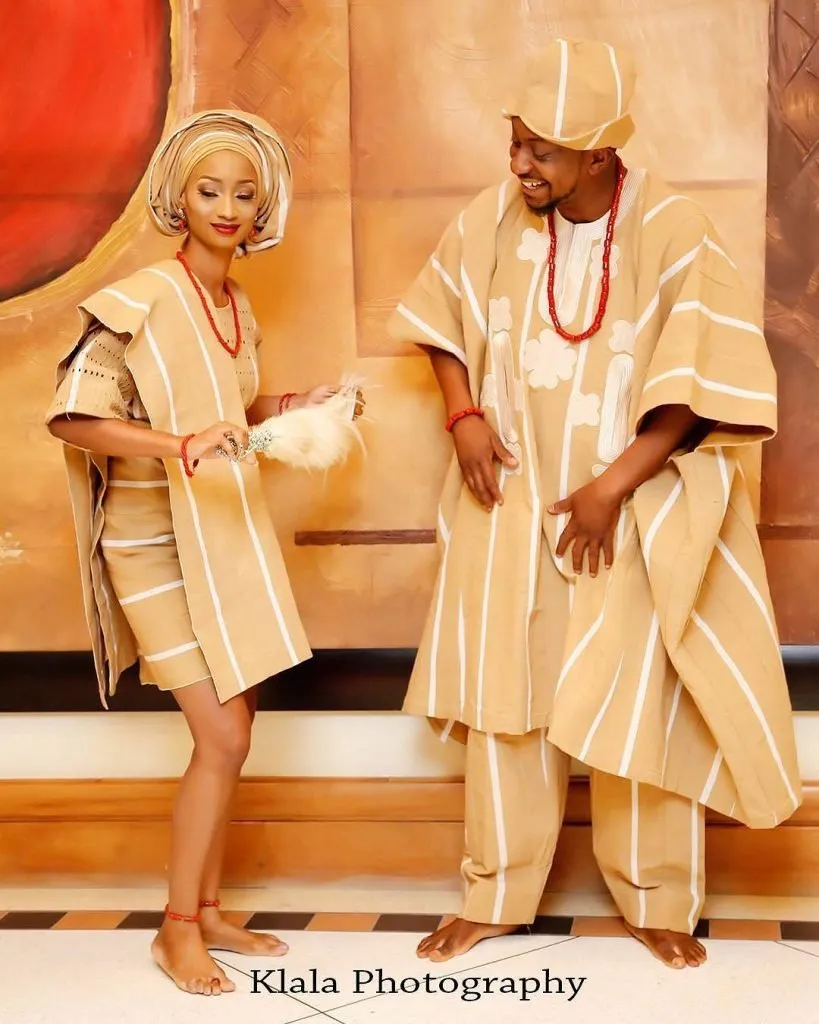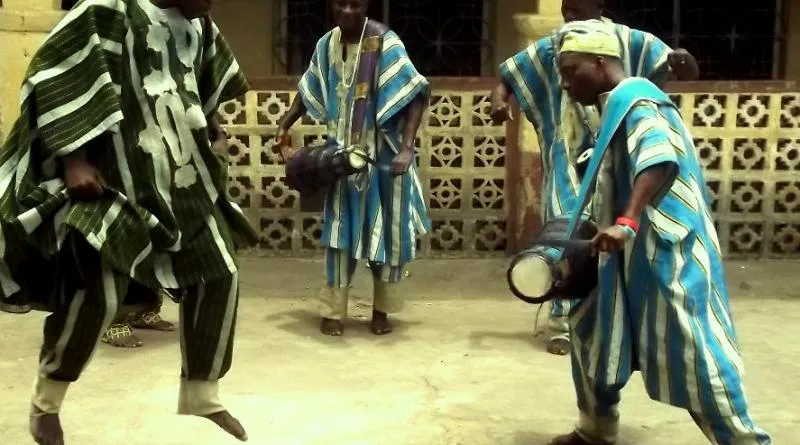Mo tun ti de bi mo se n de ni gbogbo Ọjọrú. Mo ki gbogbo eni to fi asiko won si le lati wa si ori eto yi loni. A ji nde lara yin o maa je o.
Aṣa Igbeyawo ni mo muwa fun yin loni, Ẹ joko, Ẹ tẹti ki ẹ mo nipa Asa Igbeyawo Ilẹ Yorùbá.

KINI AṢA IGBEYAWO NÍ ILẸ YORÙBÁ?
Igbeyawo je nkan pataki ninu asa ati ise Ilẹ Yorùbá, o si je ohun ti ko se fọwọ ro sẹyin ni igbesi aye ọkunrin ati obinrin.
Igbeyawo Ilẹ Yorùbá je ohun ti ko yẹ ki a gbagbe paapaa julo ni aye ode oni ti ikọsile ti pọ ninu igbeyawo. Ki wa ni awọn ohun ti o jẹ ki igbeyawo aye atijọ duro pẹ? Njẹ ilana igbeyawo ti a n lo ni aye isin ni o fa ti ikoraẹni silẹ fi po? E bami kalọ ninu eto yi lati mọ.
Igbeyawo ni Ilẹ Yorùbá ko kin se fun Tọkọtaya nikan ṣugbọn fun gbogbo ẹbi ọkọ ati Iyawo, Igbagbọ awọn Yorùbá ni pe ti eniyan ba n se igbeyawo, kii se ẹni ti o fe ni o se igbeyawo pelu bi ko se awọn ẹbi eni na.
AWỌN IGBESẸ IGBEYAWO NÍNÚ AṢA ATI IṢE ILẸ YORÙBÁ
IGBESE AKOKO: IFOJUSODE
Ifojusode je nkan ti awon ebi ọmọ ọkunrin tabi ọmọ ọkunrin ti o ti to gbeyawo maa n se nipa wiwa ọmo obinrin ti o niwa, ti o lẹwa ti o si wa lati ile ire fun ọmọ wọn lati fẹ tabi ti ọmọ ọkunrin le maa wa fun ara re.
IGBESE IKEJI: IWADI SISE
Awọn ẹbi ọmọ ọkunrin naa yio bẹrẹ si ni wadi nipa iru ile ti obinrin naa ti jade wa. Eyi ni lati mo nipa ẹbi naa boya wọn ni asiri kan tabi egun idile tabi arun kan ti o maa n da wọn laamu ninu ẹbi naa nitori wipe awọn ẹbi miran le ni arun were, kiku ni kekere, warapa ati bẹẹ bẹẹ lọ ti ko si je nkan ti o dara. Wọn a tun se iwadi nipa iyawo ti wọn fẹ fẹ na boya o je eniyan ti won le fẹ wọle nipa mimọ boya o jẹ oni suuru , oninu fufu, Onimọtoto tabi ọbun. Ni igba miran wọn a maa bere lowo alufa(Baba alawo) ki o ba wọn wo ọjọ iwaju awọn mejeeji ninu igbeyawo naa, apẹrẹ ohun ti awọn alufa maa n ri nipe, ọkọ tabi iyawo ko ni ẹmi gigun tabi pe igbeyawo naa yio ni alubarika to pọ ati bẹẹ bẹẹ lo.
IGBESE KẸTA: ALARINA
Alarina jẹ eniyan kan ti o sunmọ ọkọ ati iyawo, eniyan ti yio wa laarin awọn mejeeji fun ibarawonsọrọ nitori pe ni akoko yen ọkọ ati iyawo ko ni tii maa ni ajọsọpọ ọrọ, wọn o maa barawonsọrọ pelu iranlọwọ Alarina. O le jẹ ọrẹ ọkọ tabi ọrẹ iyawo timọtimọ. Alarina yi nio maa royin fun iyawo bi ọkọ rẹ ti se ri, nio si maa jise ẹni kan fun eni kẹji, eyi ni lati mu gbogbo igbese na lọ geerege titi ti yio fi fi ọkọ ati iyawo han ara wọn.
IGBESE KẸRIN: IJOHẸN TABI ISIHUN
Ni ipele yi, ko si inilo fun alarina mọ laarin ọkọ ati iyawo. Ọko ti mọ oju Iyawo, Iyawo naa ti mo ọkọ rẹ. Nibi igbese kẹrin yi ni ọmọ obinrin yio ti gba lati je iyawo ọkunrin, lai ti gba oruka (gẹgẹ bi afẹsona), sugbọn ọkunrin naa gbọdo san “Owo Isihun” fun obinrin naa pe o ti jẹ ni O.
IGBESE KAARUN: IDANA
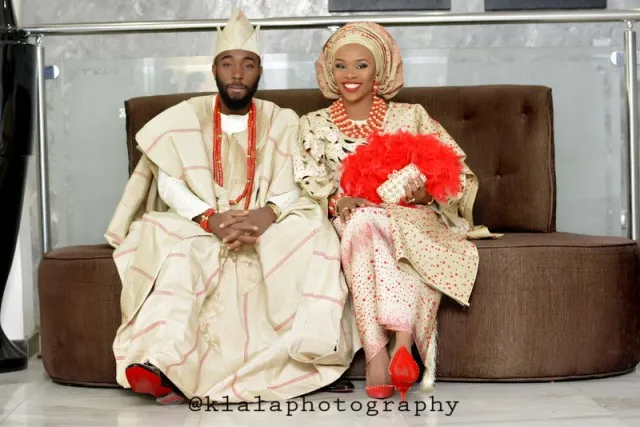
Source
Leyin ti ọmọ obinrin naa ti gba lati di iyawo ọkunrin naa, Ọkunrin naa yio wa so fun awọn obi rẹ pe ohun ti ri ododo kan ti o rẹwa ti ohun fẹ ja ninu ile kan. Baba ọkunrin yio wa bẹrẹ si ni se igbaradi lati lọ tọrọ ọmọ obinrin lọdọ awọn obi rẹ. Ni igba akoko ti won ba lọ yoju nile awọn obinrin naa, Baba ọkọ ati awọn ebi die ni o losi ile awọn ọmọ obinrin laarọ kutukutu. Leyin ti Baba iyawo ba ti gba lati fun wọn ni ọmọ, yio wa fi ye wọn wipe ohun nikan kọ ni ohun bi ọmọ naa(Igbagbọ wọn nipe gbogbo ilu loni ọmọ). Leyin eyi ni yio wa fun wọn ni ọjọ kan pato fun eto mọmi n mọ ọ ti gbogbo ẹbi yio wa nibẹ.
Obi awọn ọmọ mejeeji yio wa maa pe gbogbo awọn ẹbi wọn lati sọ fun wọn nipa ẹto mọmi n mọ ọ. Nibi ẹto yi ni gbogbo ẹbi yio ti mọ ara wọn, wọn le se ni owurọ, wọn si tun le se ni irọle. Awọn ẹbi ọkọ yio si gbe awọn ẹbun orisirisi lọ fun momi n mo o.Awọn ẹbun yi ni a n pe ni ERU IYAWO
Awọn ẹbun bii;
- Oyin, ireke, iyo( Ki ibagbepo won le ni adun to po)
- Obi ati Orogbo(Ki awon mejeeji le dagba ki won dogbo)
- Ataare( Ki Iyawo le bi omo pupo)
- Ẹpo pupa( Ki igbeyawo naa lẹ jẹ irorun lai si Ija)
- Ọpọlọpọ Isu, Eso ati awọn ounjẹ miran fun awọn ẹbi iyawo
- Owo ori( Ti iyawo ati awọn owo kekeke miran fun awọn mọlẹbi
- Ẹmu ati awọn ọti miran lati fi se ayẹyẹ na.
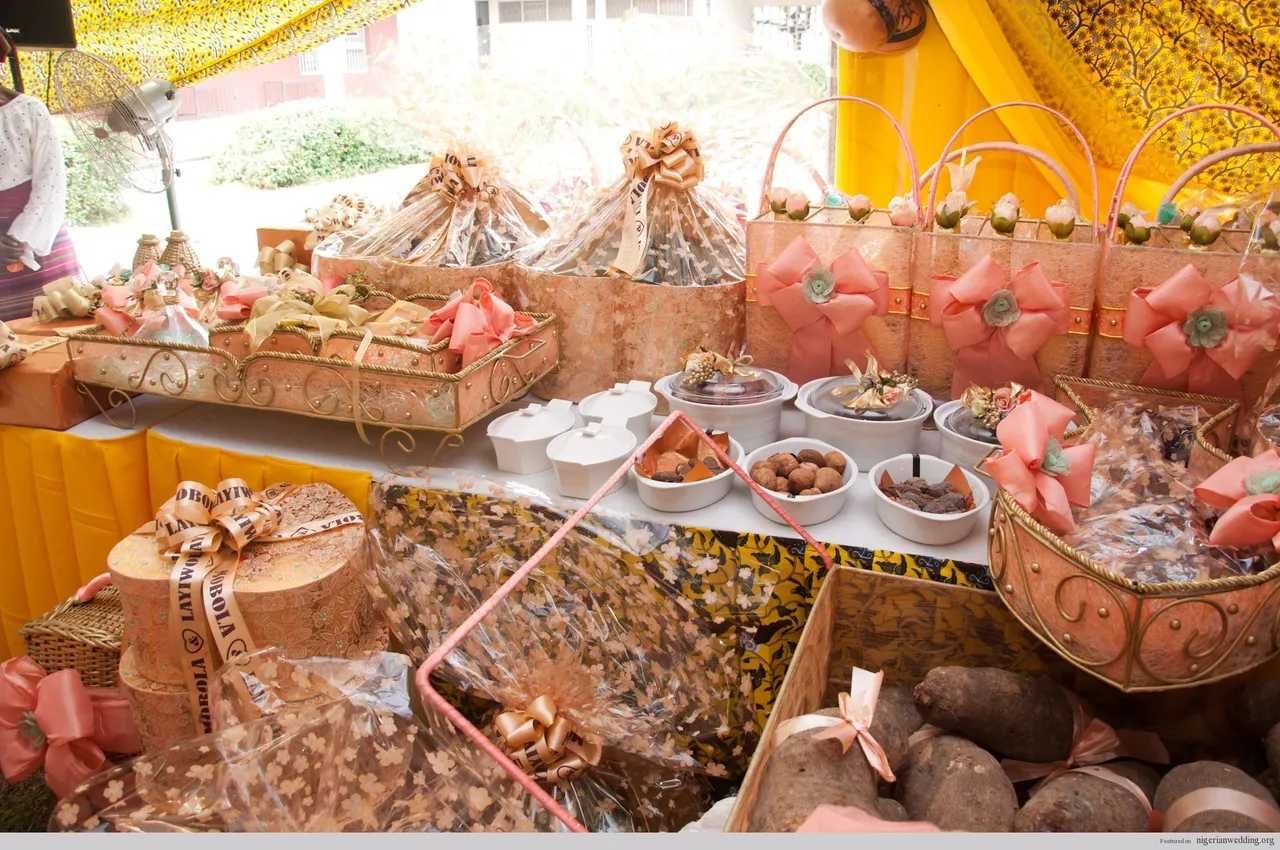
Source
Ẹni ti o dagba ju ninu ẹbi Iyawo yio fi ọmọ obinrin naa le ẹni ti o dagba ju ninu ẹbi ọkọ lọwọ, ti wọn o si maa ka ohun ti wọn ko gbọdo se fun ọmọ won, gẹgẹ bi eewọ ati ofin, bi apẹre "Pe wọn ko gbọdo naa ọmọ won tabi fi iya jẹ, Pe ọmọ wọn kii je awọn ounje kan tabi imiran. Leyin eleyi ni iyawo yio bẹrẹ si ni ko gbogbo ẹru rẹ si oju kan lati maa mura ile ọkọ rẹ.
IGBESE KẸFA: IGBEYAWO
Igbeyawo gẹgẹ bi orukọ rẹ, tumo si gbigbe Iyawo lọsi ile ọkọ. Ọjọ igbeyawo yi maa n je ọjọ ti o maa n larinrin pẹlu dida lori bi awọn ẹbi mejeeji se lowo to, Ounje maa n wa lọpọ yanturu, olorin yio maa korin ti awọn eniyan yio si maa jo.
To ba wa di ni ọjọ rọ(Irọle), ni ọjọ igbeyawo, Iya iyawo yio pe ọmọ rẹ lati fun ni ọrọ isiti bi wọn se n gbe ilẹ ọkọ, eni ti o dagba julọ ninu ẹbi, iya ati baba yio wa se adura fun. Lẹyin eleyi awon ẹbi iyawo yio maa sin losi ilẹ ọkọ re.
Ki iyawo tuntun to de ilẹ ọkọ, ọkọ gbodo jade nile nitori pe eewo ni fun iyawo asẹsẹ gbe lati ba ọkọ rẹ nile. Kete ti iyawo ba de ile ọkọ re, ki o to wole, wọn o bu omi tutu si iyawo lese ki ara le tu ninu ile ọkọ re. iyawo yio losi odo ẹni tio dagba ju ninu ẹbi ọkọ re fun adura.
Ni aye atijo, awon Yorùbá pataki obinrin ti ko ti mo okunrin ni fife, Ti o ba wa di ale ojo igbeyawo, Ọkọ gbọdo ba Iyawo re ni ajọsepo lati mọ boya iyawo re si wa ni odidi(bọya koi ti mọ ọkunrin). Ti ọmọ obinrin na ba ti mọ ọkunrin, ọkọ ti o gbe ni iyawo le kọ silẹ, yio si da pada si ọdọ awọn obi re, awọn ti wọn sin iyawo wa si ile ọkọ ni won o lọ jise fun awọn obi rẹ. Ti awọn ẹbi ọkọ yio si fi awon nkan ranse lati fi se ami pe won ko ba ọmọ wọn nile. Awọn nkan bi Agbe ẹmu abo, Korofo ishana ati bẹẹ bẹẹ lo, eleyi ti yio maa je idojuti fun awọn obi iyawo naa. Sugbon ti ọkọ ba ba iyawo rẹ nile, iwuri ni yio je fun awon obi iyawo ti awọn ẹbi ọkọ yio si fi ẹbun orisirisi ranse si awon obi iyawo pe won fun awon ni omo to pe.
Lẹyin igbeyawo, ohun ti gbogbo ẹbi, ara ati orẹ yio maa reti nipe ki iyawo fi inu soyun ki o si bimo lẹyin osu mẹsan nitori pe awọn Yorùbá pataki omo bibi gan.
Eleyi ni AṢA IGBEYAWO NÍ ILẸ YORÙBÁ ti o yatọ si ti ode oni. Ohun si ni okunfa ati idi ti igbeyawo aye atijọ fi maa n pẹ, pẹlu ikoraẹnisilẹ die.
TRANSLATION
Am here again like i usually do every Wednesday of the week. Greetings to everyone whom took their time to be on this show today. May you continue to be healthy.
Traditional wedding in Yoruba land is the topic for today, Please sit back and know a little about The Yoruba Traditional Wedding.
WHAT IS IT ABOUT THE TRADITIONAL WEDDING IN YORUBA LAND.
Wedding is something very important in the customs and practices of the Yoruba land, And it is a very important part of a persons life.
Traditional wedding in Yoruba is not something we should forget most especially nowadays that we have high rate of divorce and separation in marriage. What are those things that made the olden days traditional wedding last long? Could it be the process we use this days that contributed to the level of divorce? Find out here only if you read till the end.
Wedding in Yoruba land is not for couples alone but for both families(The man and the woman). The Yorubas believe that when a person is getting married, he/she is not actually getting married to the partner but to the family of the partner.
THE STEPS FOR THE YORUBA TRADITIONAL WEDDING.
STEP ONE: SEARCHING.
Searching in this context means; what the parent of the guy whom is due for marriage or the guy himself does on finding a woman who is beautiful, well behaved and from a good family for their son to marry or for himself to get married to.
STEP TWO: INVESTIGATION:
The guys parent will start series of investigation about the family the lady came from. This is to get some facts about the family maybe they have certain hidden secret or generational curse, a usual disease or ailment in the family, because some families may have history of madness, untimely death, epilepsy and so on, which is not a good thing. They will also investigate about the lady they are proposing for their son , if she is a kind of person that can come into their son's house, whether she is the patient type, or a hot tempered type, the neat one or a dirty type. Sometimes they seek the help of Ifa priest to help them ask Ifa if their union will be a good one, and to know if the lady is a person that will live long or be a fortunate person in their son's house and so on.
STEP THREE: THE MIDDLEMAN/CHAPERON
A middleman/chaperon is someone whom is very close to the lady or the guy, A person who is in between them for communicating to each other because during that period the couples will not have the opportunity to talk to themselves , they communicate with the help of the middleman, May be the guy's friend or the lady's close friend. This is the person who describe the guy to the lady explaining how her future husband looks, and disseminate information from one person to another, which helps all the steps go smoothly.
STEP FOUR: ACCEPTANCE.
At this stage, there's no more need for a middleman between the couples. the husband now know the wife and vice versa. This is where the lady will accept the guy as her husband without a ring( as a fiance), but the guy must pay ACCEPTANCE FEE to the lady for accepting his proposal.
STEP FIVE: INTRODUCTION
After the lady accept the guy as his future partner, the guy will now tell his own parent that he has found a beautiful flower in a particular house.. The father of the guy will start preparing to go visit the lady's parent to seek her hand in marriage. For the first visit, The groom's father will go with few family member to the bride's parent house very early on the chosen day. After the bride's father accept to give them his daughter, he then make it clear to them that he didn't give birth to the child alone (Because the believe then is that the child belong to the whole community). He then give them a fixed date for proper introduction where all the family member will be present.
The parent of the two parties will start calling and informing their family members about the introduction. It is during the introduction that all family gets to know themselves, it can be done in the morning or at dusk. The groom's family will bring a lot of gift for the introduction popularly known as Engagement Gifts.
Gifts like;
- Honey, sugarcane and salt.
- Kola nut and bitter kola.
- Alligator pepper
- Tubers of yam
- Dowry(Main dowry for the wife and some other money for family members)
- Jars of palm wine and drinks.
STEP SIX: WEDDING DAY
Wedding day as the name implies is the D-day, a very shiny and fun fill day depending on how wealthy both family is, there is always lots of food available and there are singers on the day to entertain the guests.
At dust on the same day, the bride's mother call her daughter to give her words of advice on how to behave in her husband house, the eldest person in the family, her father and mother then pray for her. After which her family and friends escort her to her new home.
Before she gets to her husband house, the husband have to leave the house because its an abomination for a newly wedded wife to meet her husband in the house, immediately she gets there before she go in, cool water will be pour on her leg so that she have comforts in her husband house, after that she will go to the eldest person in her husband's family for prayers from the person.
In the olden days, Yoruba gave a lot importance to marrying a virgin lady, on the wedding night, the husband must have sex with his wife just to be sure if her wife is still a virgin. If she isn't a virgin, her new husband may reject her and send her back to her parents, and her escorts will be the once to go break the news to her parent.
The groom's family will send some things to the bride's parent to signify that their daughter wasn't met a virgin, they send things like Half filled jar of palm wine, Empty match box etc. which will definitely be a disgrace to the bride's parent. But if the lady happens to be a virgin then it will be a pride for the bride's parent, and the groom's parent send them gifts for giving them a complete woman as a wife.
After the wedding day. What all the family members expect is for the wife to get pregnant and give birth after 9 months because having children in a marriage is very important in Yoruba land.
This is the Traditional wedding of the Yoruba land different from what we do today. And which is the cause and reason for last long wedding in the olden days and which reduces divorce rate.
FUN CORNER



3REASURE HUNT
Is Time to Hunt For 3reasure even though people have not been hunting for it because it's not a show by @surpassinggoogle or @ned.
PROVE YOUR INTELLIGENCE
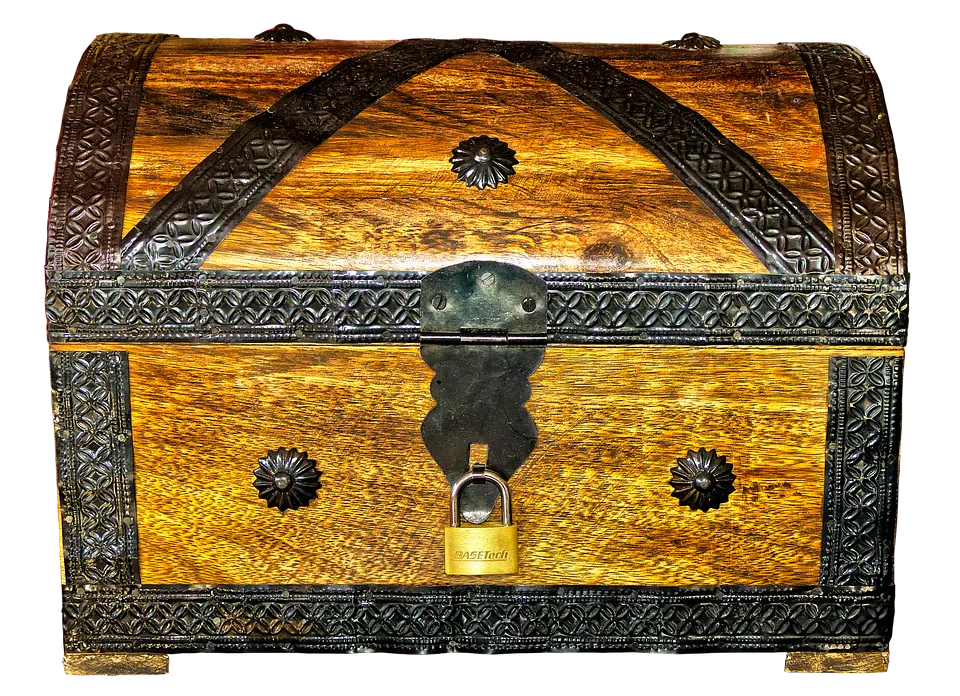

SPECIAL APPRECIATION
I specially appreciate everyone who took their time to join me on this show every wednesday.
Most especially those that motivated me to bring this PROGRAM Alive with their full support.
@eurogee, @smyle, @drigweeu,@adoore-eu, @zoneboy, @ogoowinner, @zizymena, @sweetestglo-eu, @jeaniepearl, @surpassinggoogle, and @euronation members.
Using this medium to say HAPPY BIRTHDAY IN ARREARS TO MY LOVE @DRIGWEEU.
STAY COOL TILL I COME NEXT WEEK.
LOVE YOU ALL »»»»»»KISSES»»»»»>MUAH!!!
DON'T FORGET TO»»»»»»»»»»»»»»
